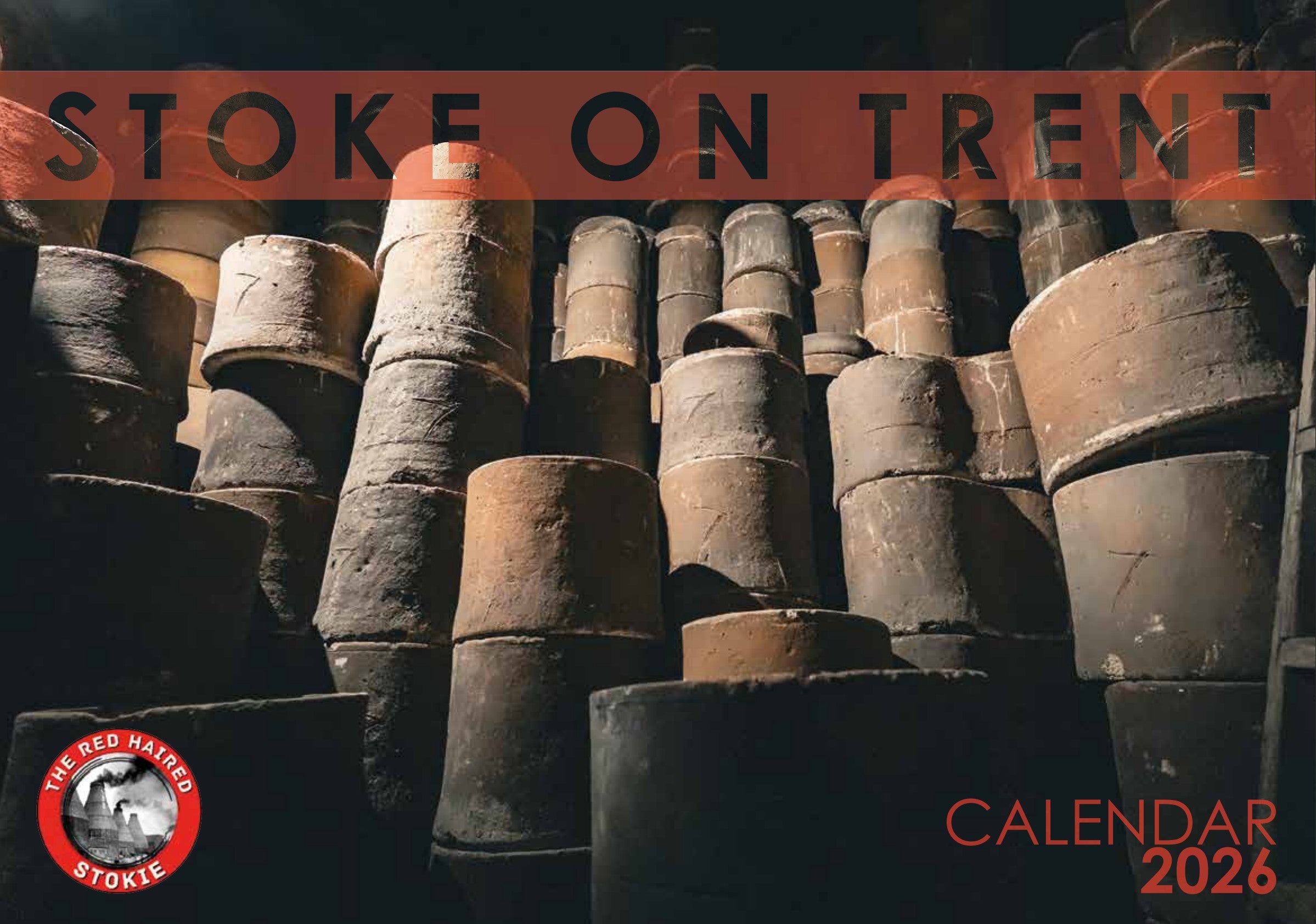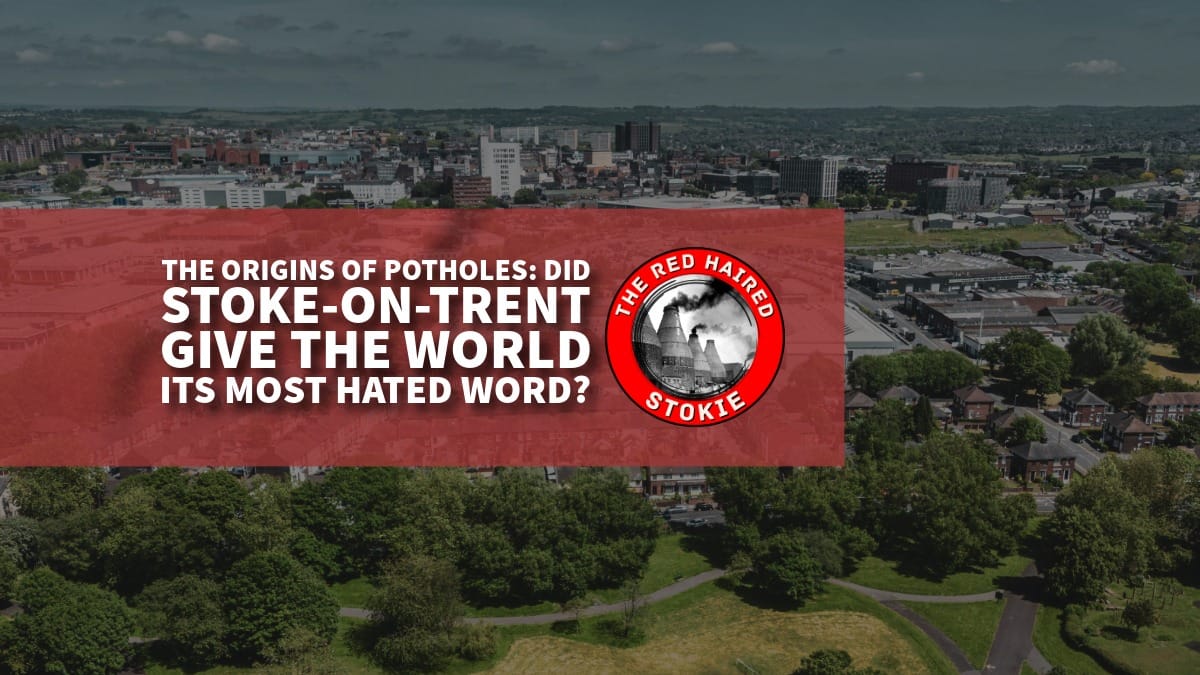Ask anyone in Stoke-on-Trent where potholes came from and you may hear the same answer: “Potters dug clay out of the roads and that is why we call them potholes.” It is a story that has been told for generations in the Potteries, but how much of it is true?
The word pothole today conjures up images of burst tyres, bent wheels and angry drivers, but its history goes much deeper, and the tale does indeed have a strong link to North Staffordshire.
Watch the video on YouTube here
The language of potholes
Etymologists, the experts who trace the origins of words, give a cautious answer. The earliest recorded use of pothole comes from 1826, not in relation to roads at all, but to geology. At that time, a pothole described a natural cavity in rock, often found in caves or riverbeds. The word pot itself was used in Middle English dialects to mean a pit, hollow or cavity, long before it was applied to the making of pots. The term pothole, meaning a cavity in a road surface, does not appear until the early 1900s.
So, linguistically speaking, the word does not prove a pottery connection. But Stoke-on-Trent’s own history shows why the idea stuck.

Don't forget to order your 2026 Stoke-on-Trent calendar!
Potters and the roads
For centuries, clay was the lifeblood of the Potteries, and before canals and railways made transport easier, potters often took clay from the land closest to them, sometimes from the roads themselves. This was not just a rumour.
In 1448, Richard Adams and William, his brother, were fined “for digging clay in the common road between Sneyd and Burslem.” Other records from the same period mention locals being punished for leaving pits and holes in the highways.
By the sixteenth and seventeenth centuries, complaints about potters damaging the highways were common. Roads in and around Burslem and Tunstall became scarred with holes where clay had been dug out, making travel treacherous. Even centuries later, local histories and court documents continued to refer to potters’ holes in the road.
Why are they called potholes?
One of the most widely repeated explanations ties the term directly to the pottery industry:
“Pottery makers in fifteenth and sixteenth-century England would take advantage of the ruts that wagon and coach wheels gouged into roads. Anxious for a cheap source of raw materials for making clay pots, the potters would dig into the deep ruts to reach clay deposits underneath. People driving wagons and coaches over those roads knew who and what caused these holes and referred to them as ‘potholes’.”
Whether or not this is the etymological origin, it reflects a real practice in clay districts and one that left a lasting impression on the people who used those roads.
Burslem, the mother town of potholes?
Burslem, the mother town of the Potteries, grew from a small community of farmer-potters in the seventeenth century. Its early prosperity came from making butter pots, and by the late 1600s, the town was already associated with road damage caused by clay digging.
“Starting as a small community of farmer potters in the mid-seventeenth century, the trade of making butter pots for the easier marketing of butter developed in the town of Burslem. Thus, Burslem earned the position of mother town of the Potteries. Before 1700, potters were criticised for digging holes in the roads to obtain clay, a practice which gave rise to the term ‘potholes’. Good red-burning clays and excellent long-flame coal, essential for firing pottery ovens, could be dug from the surface along a belt running in a north-west to south-east line, due to geological formation causing outcropping of these materials.”
This passage shows how closely geology, industry and local roads were entwined in the Potteries. The resources that built the industry also scarred its transport routes.
Myth and memory
The link between potholes and pottery may not be the etymological origin of the word, but it is a powerful piece of local folklore rooted in truth. The people of Stoke-on-Trent really did suffer broken roads because of clay digging, and the potters’ reputation for leaving behind dangerous holes endured.
When the word pothole eventually took on its modern road meaning, it is easy to see why the Potteries claimed ownership of the story. Few places in England could say with certainty that their roads were literally broken by potters.
So did Stoke-on-Trent invent the word pothole? The evidence suggests not. The word comes from older dialect roots where pot meant a pit or hollow, and its first recorded use was in a geological sense. But did the Potteries give us the enduring story of potholes, with clay-digging potters blamed for dangerous highways? Absolutely.
The next time you hit a pothole on a Staffordshire road, you can blame modern tarmac and traffic, but remember too that the link between potholes and pottery is part of Stoke-on-Trent’s long and fascinating history.
Proud of our past, excited for our future
The Staffordshire Signal is a free, non-profit monthly print magazine with real local stories, an online events calendar & directory. Take a look, follow us & sign up to the newsletter ⬇
The Staffordshire Signal – www.staffordshiresignal.co.uk
The Red Haired Stokie – www.theredhairedstokie.co.uk
Support The Staffordshire Signal with our weekly local prize draws - https://www.crowdfunder.co.uk/user/jenna-81/profile/projects
Support The Red Haired Stokie in the Staffs Moorlands Lotto. Just £1/week & win up to £25K! https://www.staffsmoorlandscommunitylottery.co.uk/support/the-red-haired-stokie-cic

